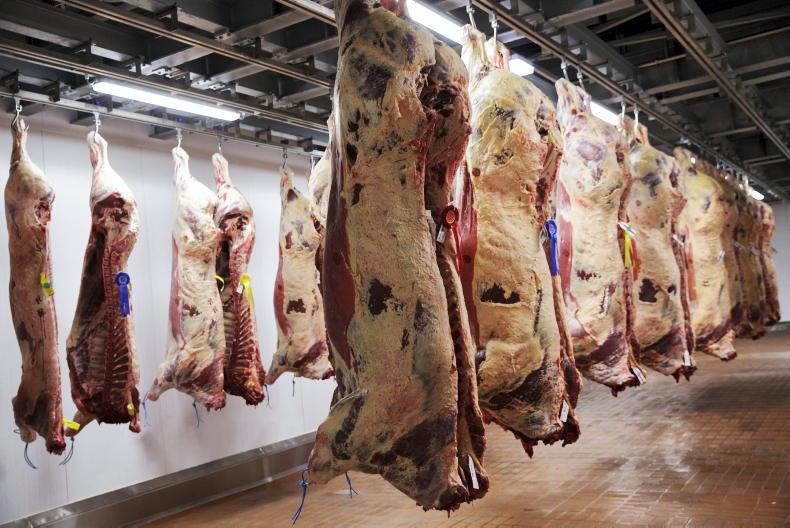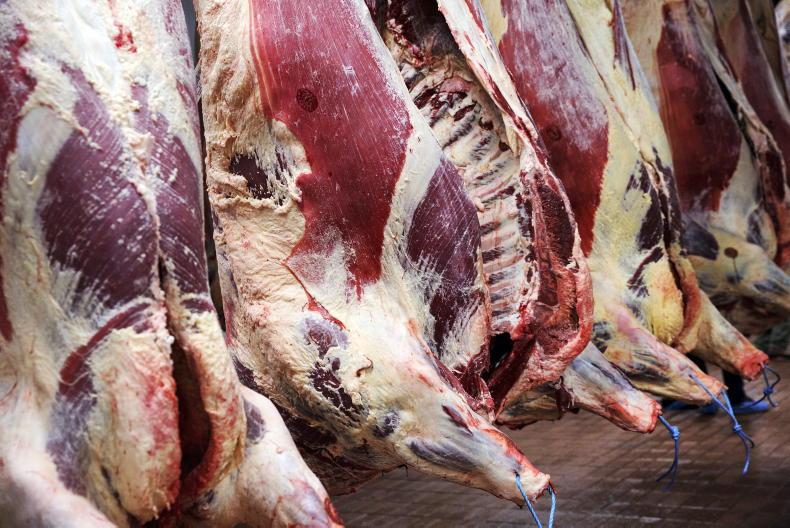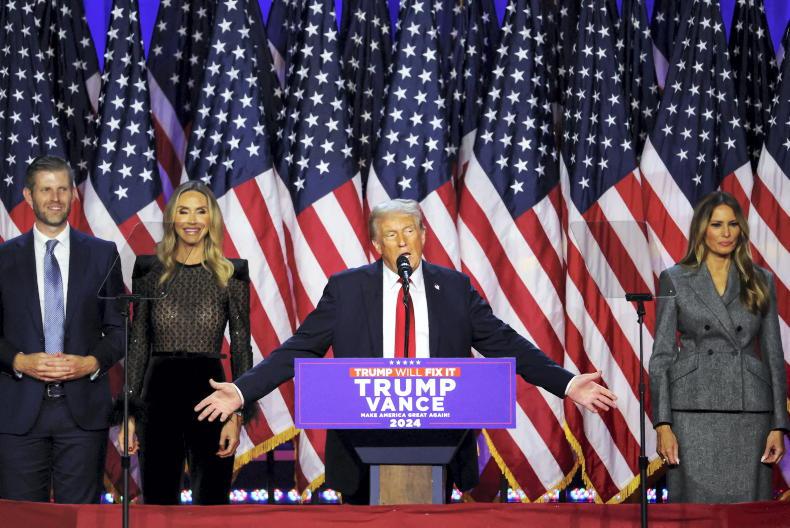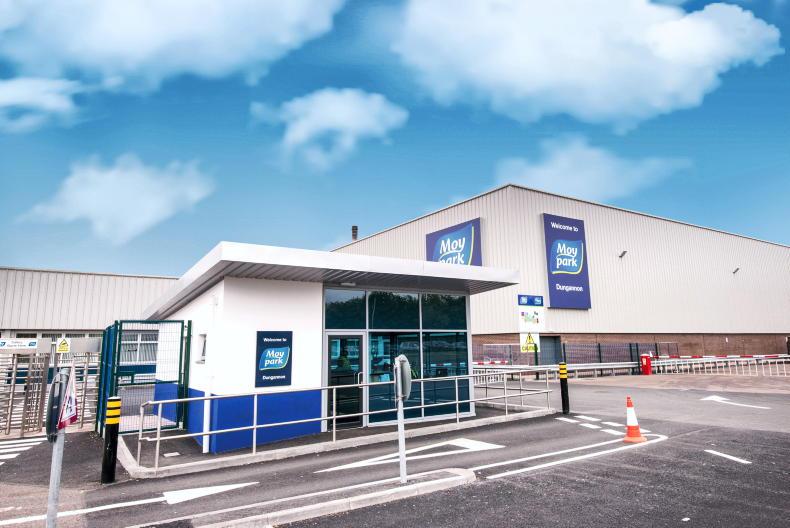US beef factories Tyson Foods Inc, Cargill Inc, JBS USA and National Beef Packing Co are all being taken to court by US beef farmers.
Since 2013, the four factories control over 80% of the US finished cattle kill in the US.
In a 121-page court action filed with the district court in northern Illinois, the Ranchers Cattlemen Action Legal Fund United Stockgrowers of America (R-CALF) say that the court action challenges the factories’, called the 'packing defendants' in the documents, conspiracy to suppress the price of fed cattle that they purchased in the United States, from at least 1 January 2015 through to the present.
Conduct
“Packing defendants’ co-ordinated conduct, including slashing their respective slaughter volumes and curtailing their purchases of fed cattle in the cash cattle market, precipitated an unprecedented collapse in fed cattle prices in 2015.
“Packing defendants then continued to suppress the price of fed cattle through coordinated procurement practices and periodic slaughter restraint,” they allege.
The ranchers say that the factories can increase their profits by working together to reduce their respective slaughter volumes, thereby depressing beef prices.
Fed cattle prices increased steadily between 2009 and 2014 in response to strong beef demand
“Against this backdrop, fed cattle prices increased steadily between 2009 and 2014 in response to strong beef demand and a shortage of fed cattle following the droughts of 2011 through 2013.
"After prices peaked in November 2014, the industry expected the price of fed cattle to stabilise in 2015 and continue at or around that level for a number of years.
“This widely predicted price stability did not occur. Instead, packing defendants used their market power, price sensitivities and the thin cash cattle trade to their advantage and embarked upon a conspiracy to depress fed cattle prices,” they say.
‘Co-ordinated conduct’
This alleged conspiracy was carried out in five steps, according to the ranchers:
1. A reduction in slaughter volumes so as to reduce demand for fed cattle.2. Packing defendants curtailed their purchase and slaughter of cash cattle during those same periods.3. Packing defendants co-ordinated their procurement practices for cash cattle.4. Packing defendants imported foreign cattle at a loss so as to reduce domestic demand.5. Packing defendants, simultaneously, closed and idled plants.The ranchers also say that witness accounts, trade records and economic evidence confirm the factories agreed to depress prices.
In a statement to the Irish Farmers Journal in response to the court action, a Tyson Foods spokesperson said the company is disappointed this "baseless" case was filed.
"As with similar lawsuits concerning chicken and pork, there’s simply no merit to the allegations that Tyson colluded with competitors.
"This complaint is nothing more than another transparent and opportunistic attempt by attorneys to make money for themselves at the expense of consumers. Tyson operates with integrity every day. We welcome competition, which makes us a better company, enhances the quality of our products and provides more choices at greater value to our customers.
"We depend on thousands of independent cattle, pig and chicken farmers and ranchers as a vital part of our supply chain. Contrary to the assertions in this lawsuit, Tyson wants its suppliers to succeed. Tyson will vigorously defend itself and its proud heritage of supporting America’s farmers and ranchers," the spokesperson said.
Read more
US beef farmers to sue factories
IFA has beef with vegan climate change claims
US beef factories Tyson Foods Inc, Cargill Inc, JBS USA and National Beef Packing Co are all being taken to court by US beef farmers.
Since 2013, the four factories control over 80% of the US finished cattle kill in the US.
In a 121-page court action filed with the district court in northern Illinois, the Ranchers Cattlemen Action Legal Fund United Stockgrowers of America (R-CALF) say that the court action challenges the factories’, called the 'packing defendants' in the documents, conspiracy to suppress the price of fed cattle that they purchased in the United States, from at least 1 January 2015 through to the present.
Conduct
“Packing defendants’ co-ordinated conduct, including slashing their respective slaughter volumes and curtailing their purchases of fed cattle in the cash cattle market, precipitated an unprecedented collapse in fed cattle prices in 2015.
“Packing defendants then continued to suppress the price of fed cattle through coordinated procurement practices and periodic slaughter restraint,” they allege.
The ranchers say that the factories can increase their profits by working together to reduce their respective slaughter volumes, thereby depressing beef prices.
Fed cattle prices increased steadily between 2009 and 2014 in response to strong beef demand
“Against this backdrop, fed cattle prices increased steadily between 2009 and 2014 in response to strong beef demand and a shortage of fed cattle following the droughts of 2011 through 2013.
"After prices peaked in November 2014, the industry expected the price of fed cattle to stabilise in 2015 and continue at or around that level for a number of years.
“This widely predicted price stability did not occur. Instead, packing defendants used their market power, price sensitivities and the thin cash cattle trade to their advantage and embarked upon a conspiracy to depress fed cattle prices,” they say.
‘Co-ordinated conduct’
This alleged conspiracy was carried out in five steps, according to the ranchers:
1. A reduction in slaughter volumes so as to reduce demand for fed cattle.2. Packing defendants curtailed their purchase and slaughter of cash cattle during those same periods.3. Packing defendants co-ordinated their procurement practices for cash cattle.4. Packing defendants imported foreign cattle at a loss so as to reduce domestic demand.5. Packing defendants, simultaneously, closed and idled plants.The ranchers also say that witness accounts, trade records and economic evidence confirm the factories agreed to depress prices.
In a statement to the Irish Farmers Journal in response to the court action, a Tyson Foods spokesperson said the company is disappointed this "baseless" case was filed.
"As with similar lawsuits concerning chicken and pork, there’s simply no merit to the allegations that Tyson colluded with competitors.
"This complaint is nothing more than another transparent and opportunistic attempt by attorneys to make money for themselves at the expense of consumers. Tyson operates with integrity every day. We welcome competition, which makes us a better company, enhances the quality of our products and provides more choices at greater value to our customers.
"We depend on thousands of independent cattle, pig and chicken farmers and ranchers as a vital part of our supply chain. Contrary to the assertions in this lawsuit, Tyson wants its suppliers to succeed. Tyson will vigorously defend itself and its proud heritage of supporting America’s farmers and ranchers," the spokesperson said.
Read more
US beef farmers to sue factories
IFA has beef with vegan climate change claims









SHARING OPTIONS